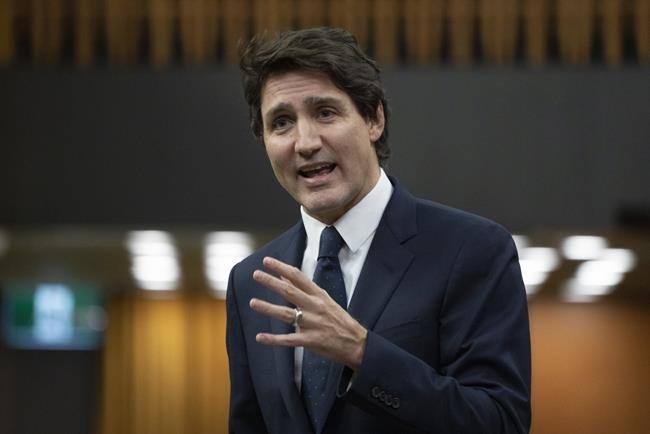OTTAWA — Prime Minister Justin Trudeau is calling on Uganda to repeal legislation the East African country passed this week to bring in a death penalty targeting members of the LGBTQ community.
The legislation prescribes the death penalty for the offence of "aggravated homosexuality," such as having sex while being HIV positive, and life imprisonment for homosexuality, as well as jail terms of up to 20 years for those promoting LGBTQ rights.
A suspect convicted of "attempted aggravated homosexuality" can be jailed for 14 years and the offence of "attempted homosexuality" is punishable by up to 10 years, according to the bill.
Trudeau says he wants to "condemn in the absolute strongest terms the despicable law put forward by the Ugandan government" and that Ottawa "stands against" it.
The prime minister says he's considering options to support the LGBTQ community in Uganda, and that all world leaders — especially fellow members of the Commonwealth — should condemn the "appalling and abhorrent" legislation.
The Uganda High Commission in Canada was not immediately available to comment.
Washington has urged Ugandan President Yoweri Museveni to block the legislation passed by lawmakers on Tuesday, and officials are publicly floating the idea of economic sanctions on Uganda, even if it hampers development dollars aimed at preventing the spread of AIDS.
So far, Trudeau has asked lawmakers to "reconsider" the bill, known as the Anti-Homosexuality Act.
The federal Conservatives are echoing the U.S. call for Museveni to veto the legislation.
"It is terrible legislation criminalizing people simply for who they are and who they love," wrote foreign affairs critic Michael Chong.
Dignity Network Canada, a coalition of Canadian organizations who advocate for LGBTQ people abroad, said Ottawa should boost support for groups that advocate for the rights of sexual and gender minorities abroad.
Coalition head Doug Kerr is also urging Ottawa to follow the U.S. in appointing an envoy to monitor LGBTQ rights internationally.
"It's not enough to simply state our support of human rights and wave rainbow flags during Pride month; we must actively promote and advance human rights through all the diplomatic tools we have," Kerr said.
Museveni has condemned homosexuality over the years and recently accused unnamed Western nations of "trying to impose their practices on other people."
The bill was introduced last month by an opposition lawmaker who said his goal was to punish the "promotion, recruitment and funding" of LGBTQ activities in Uganda.
Only two of 389 legislators present during the voting session opposed the bill. During a plenary debate, one of them was taunted by his colleagues as "a homosexualist" after he presented a dissenting view.
The UN's human rights commissioner says the law is "among the worst of its kind in the world," while UNAIDS says the legislation "threatens public health" because it would hurt efforts to fight HIV.
Colonial-era laws already ban same-sex acts, but civilian authorities have urged more sweeping legislation for years.
One bill targeting gay people was enacted in 2014 but nullified on procedural grounds by a panel of judges amid intense international pressure.
Anti-gay sentiment in Uganda has grown in recent weeks amid press reports that allege sodomy in boarding schools, including a prestigious one for boys where a parent accused a teacher of abusing her son.
The recent decision of the Church of England to bless civil marriages of same-sex couples also has inflamed many, including some who see homosexuality as imported from abroad.
This report by The Canadian Press was first published March 23, 2023.
— With files from The Associated Press
Dylan Robertson, The Canadian Press



